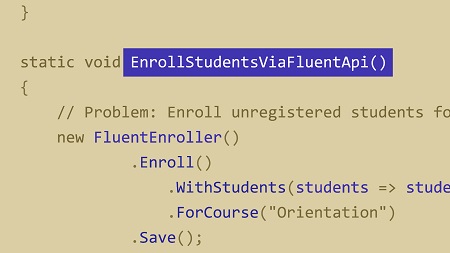English | MP4 | AVC 1280×720 | AAC 48KHz 2ch | 0h 32m | 100 MB
Fluent APIs use method chaining for maximum readability and flow. They may be slightly more complicated to write, but are much easier to understand and solve specific complex programming challenges that general-purpose languages can’t. This training course teaches the what, why, and how of fluent API development using C#. Learn the history of fluent APIs, beginning with the coining of the phrase “fluent” by Martin Fowler. Next, learn how to decide if fluent APIs are right for your project, and how to go about designing them. Instructor Robby Millsap also reviews some popular fluent libraries such as LINQ and Azure Management. Lastly, he takes a simple console application and shows how to refactor it to use fluent prose.
Topics include:
- Why fluent?
- Creating paths
- Fluent techniques
- Examples of fluent APIs
- Refactoring to fluent
Table of Contents
Introduction
1 Welcome
2 What you should know
Why Fluent
3 Defining a fluent interface
4 A quick example
5 Creating paths
Techniques
6 Method chaining
7 Using conjunctions
8 Generics
9 Indentation
10 Extension methods
Existing Fluent APIs
11 LINQ
12 Azure Management
13 Fluent assertions
Refactoring to Fluent
14 Overview of the console app
15 Diagram a fluent API
16 Code a fluent API
Conclusion
17 Next steps
Resolve the captcha to access the links!
